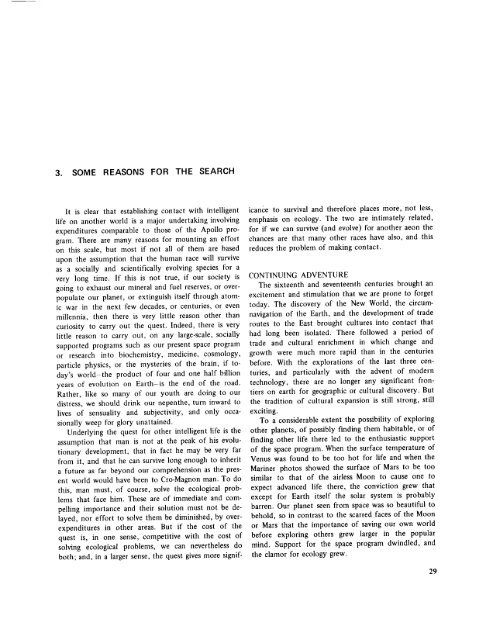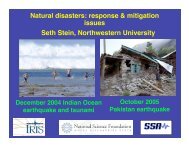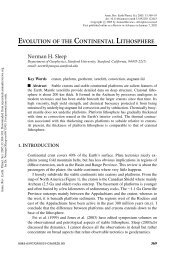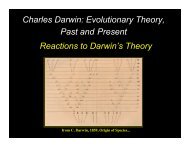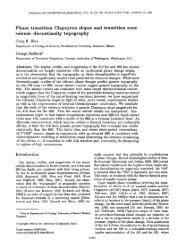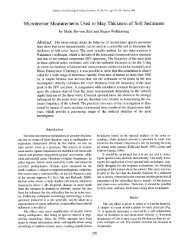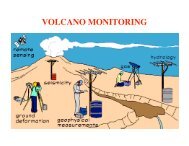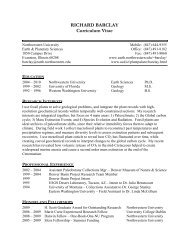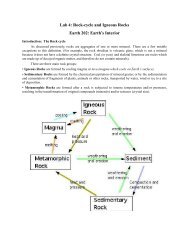Project Cyclops, A Design... - Department of Earth and Planetary ...
Project Cyclops, A Design... - Department of Earth and Planetary ...
Project Cyclops, A Design... - Department of Earth and Planetary ...
Create successful ePaper yourself
Turn your PDF publications into a flip-book with our unique Google optimized e-Paper software.
3. SOME REASONS FOR THE SEARCH<br />
It is clear that establishing contact with intelligent<br />
life on another world is a major undertaking involving<br />
expenditures comparable to those <strong>of</strong> the Apollo program.<br />
There are many reasons for mounting an effort<br />
on this scale, but most if not all <strong>of</strong> them are based<br />
upon the assumption that the human race will survive<br />
as a socially <strong>and</strong> scientifically evolving species for a<br />
very long time. If this is not true, if our society is<br />
going to exhaust our mineral <strong>and</strong> fuel reserves, or overpopulate<br />
our planet, or extinguish itself through atomic<br />
war in the next few decades, or centuries, or even<br />
millennia, then there is very little reason other than<br />
curiosity to carry out the quest. Indeed, there is very<br />
little reason to carry out, on any large-scale, socially<br />
supported programs such as our present space program<br />
or research into biochemistry, medicine, cosmology,<br />
particle physics, or the mysteries <strong>of</strong> the brain, if today's<br />
world-the product <strong>of</strong> four <strong>and</strong> one half billion<br />
years <strong>of</strong> evolution on <strong>Earth</strong>-is the end <strong>of</strong> the road.<br />
Rather, like so many <strong>of</strong> our youth are doing to our<br />
distress, we should drink our nepenthe, turn inward to<br />
lives <strong>of</strong> sensuality <strong>and</strong> subjectivity, <strong>and</strong> only occasionally<br />
weep for glory unattained.<br />
Underlying the quest for other intelligent life is the<br />
assumption that man is not at the peak <strong>of</strong> his evolutionary<br />
development, that in fact he may be very far<br />
from it, <strong>and</strong> that he can survive long enough to inherit<br />
a future as far beyond our comprehension as the present<br />
world would have been to Cro-Magnon man. To do<br />
this, man must, <strong>of</strong> course, solve the ecological problems<br />
that face him. These are <strong>of</strong> immediate <strong>and</strong> compelling<br />
importance <strong>and</strong> their solution must not be delayed,<br />
nor effort to solve them be diminished, by overexpenditures<br />
in other areas. But if the cost <strong>of</strong> the<br />
quest is, in one sense, competitive with the cost <strong>of</strong><br />
solving ecological problems, we can nevertheless do<br />
both; <strong>and</strong>, in a larger sense, the quest gives more significance<br />
to survival <strong>and</strong> therefore places more, not less,<br />
emphasis on ecology. The two are intimately related,<br />
for if we can survive (<strong>and</strong> evolve) for another aeon the<br />
chances are that many other races have also, <strong>and</strong> this<br />
reduces the problem <strong>of</strong> making contact.<br />
CONTINUING<br />
ADVENTURE<br />
The sixteenth <strong>and</strong> seventeenth centuries brought an<br />
excitement <strong>and</strong> stimulation that we are prone to forget<br />
today. The discovery <strong>of</strong> the New World, the circumnavigation<br />
<strong>of</strong> the <strong>Earth</strong>, <strong>and</strong> the development <strong>of</strong> trade<br />
routes to the East brought cultures into contact that<br />
had long been isolated. There followed a period <strong>of</strong><br />
trade <strong>and</strong> cultural enrichment in which change <strong>and</strong><br />
growth were much more rapid than in the centuries<br />
before. With the explorations <strong>of</strong> the last three centuries,<br />
<strong>and</strong> particularly with the advent <strong>of</strong> modern<br />
technology, there are no longer any significant frontiers<br />
on earth for geographic or cultural discovery. But<br />
the tradition <strong>of</strong> cultural expansion is still strong, still<br />
exciting.<br />
To a considerable extent the possibility <strong>of</strong> exploring<br />
other planets, <strong>of</strong> possibly finding them habitable, or <strong>of</strong><br />
finding other life there led to the enthusiastic support<br />
<strong>of</strong> the space program. When the surface temperature <strong>of</strong><br />
Venus was found to be too hot for life <strong>and</strong> when the<br />
Mariner photos showed the surface <strong>of</strong> Mars to be too<br />
similar to that <strong>of</strong> the airless Moon to cause one to<br />
expect advanced life there, the conviction grew that<br />
except for <strong>Earth</strong> itself the solar system is probably<br />
barren. Our planet seen from space was so beautiful to<br />
behold, so in contrast to the scarred faces <strong>of</strong> the Moon<br />
or Mars that the importance <strong>of</strong> saving our own world<br />
before exploring others grew larger in the popular<br />
mind. Support for the space program dwindled, <strong>and</strong><br />
the clamor for ecology grew.<br />
29


